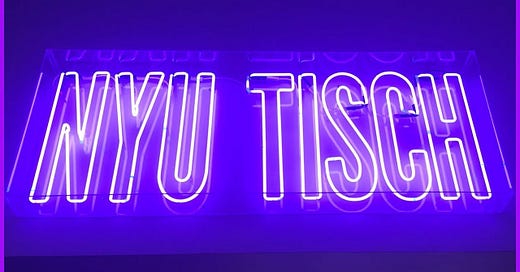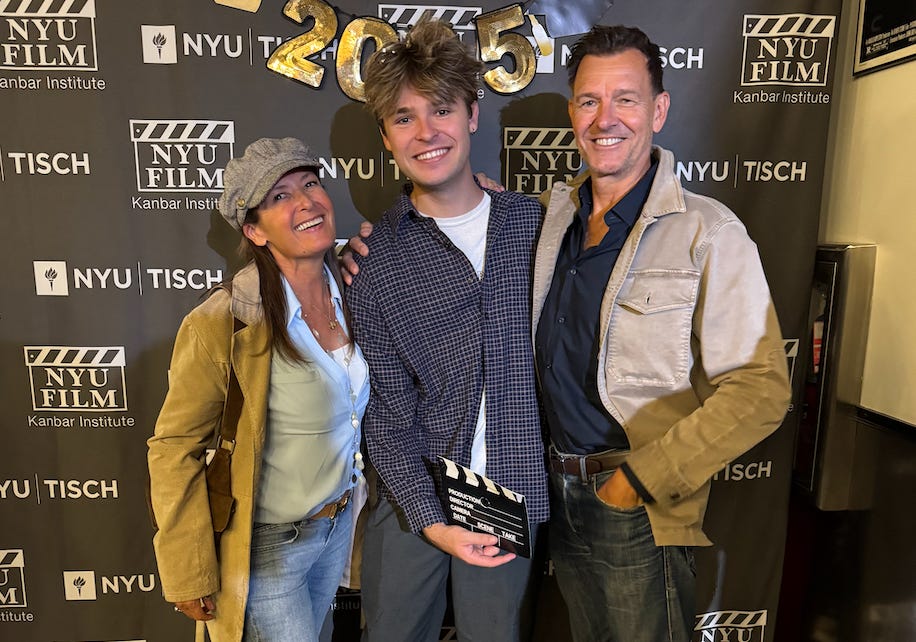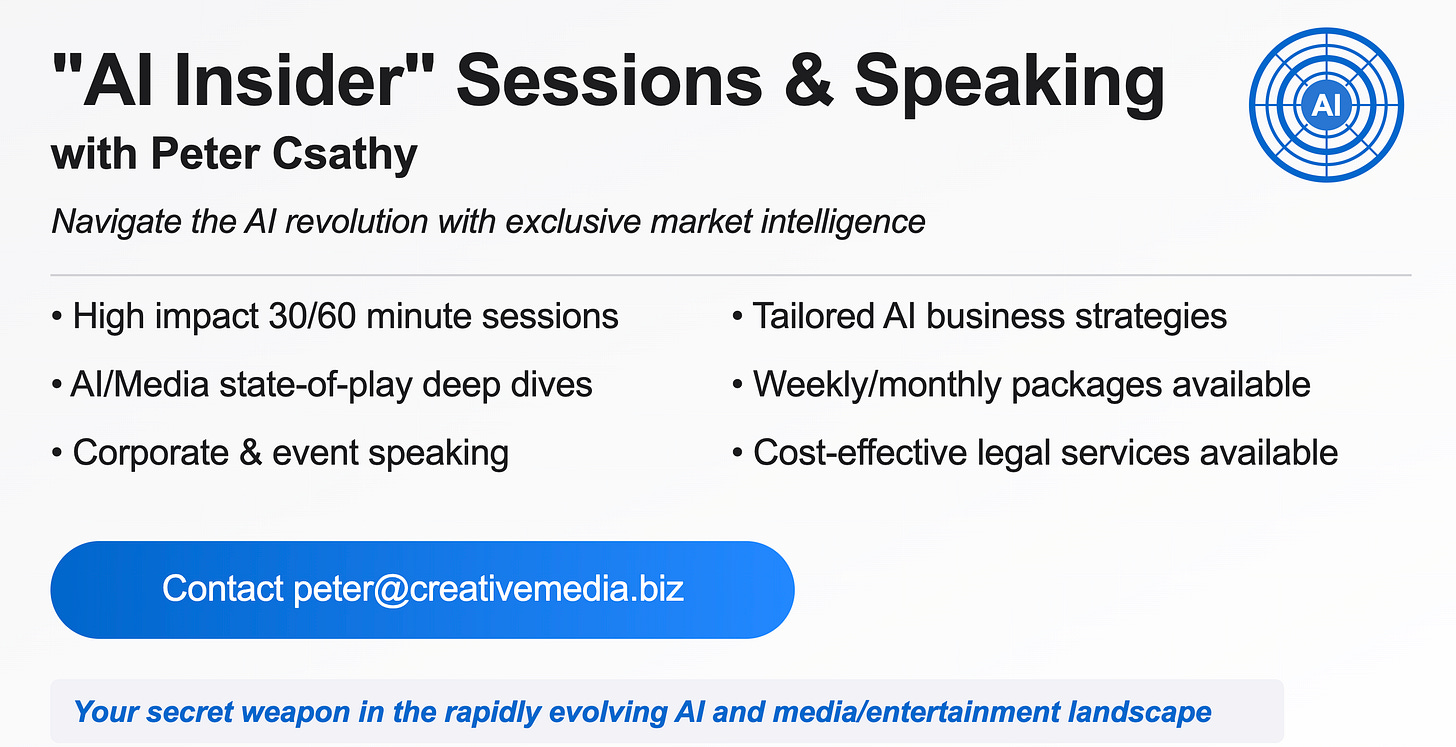My Son Just Graduated From Film School. What's The Point In An AI World?
Human Storytelling Can't Be Gamed By LLMs, No Matter How Hard They Try.
Good morning, it’s time for your Monday morning “brAIn” dump — special college graduation edition! I just returned from my son, Luca’s, graduation from NYU Tisch Film School — which led me to this week’s provocative “mAIn event.” Then, it’s the “mosAIc” — a collage of curated AI stories, events and podcasts. Finally, it’s the “AI Litigation Tracker” — updates on key generative AI-media IP infringement cases by Partner Avery Williams of McKool Smith (access the “Tracker” here via this link).
I. The mAIn Event — What’s The Point Of Film School In An Increasingly Generative AI World?
In my writing and speaking about AI and its long-term impact on the Creative Community, I try to remain stoic and non-alarmist, presenting optimistic cases as well as the more dire consequences of lost jobs, lost craft, and lost truly original Art itself. After all, many artists already consider AI to be a powerful new tool to expand their art, not threaten it.
Yet, AI’s threats to the world of the Arts and culture itself are real.
I’m already decades into my career, so AI’s impacts on my personal livelihood are muted. But how about those early in theirs or now just entering it, including my son, Luca, who just graduated from the great NYU Tisch Film School this past week (in a magical pair of ceremonies at Radio City Music Hall and Yankee Stadium)?
And that got me thinking. In a world confronted with AI’s new “challenges” to the creative arts (not to mention life in general), does an investment in film school (and what it represents for all of the Arts) still matter? Is it worth it? And at a more macro level, will human creative works even be able to stand out and be valued in a world increasingly flooded by the artificial?
It's all a matter of scale and perspective, of course. AI used as a “tool” is a fundamentally different proposition than AI as a complete self-directed and stand-alone workflow from ideation to fully realized creation. Yet both are already possible. So which is more probable?
AI Used As A Tool
As a tool, as I’ve written several times, pioneering tech-forward musical artist Grimes is Exhibit A. She created her own generative AI platform to enable her fans to leverage the power of AI to create new works that use her voice and even her music stems. She called one such fan’s AI-generated song “Cold Touch” a “masterpiece.” The cost of admission to use her app? Sharing 50% of revenues generated by app-enabled songs.
Closer to home — in the world of filmmaking — Pinar Demirdag, co-founder of AI production studio Seyhan Lee, told me long ago that her company’s “Cuebric” tech (named in an homage to the legendary filmmaker Stanley Kubrick, of course) exists “to enable creators to ideate and create in real time. To go from concept to camera in minutes.” Just type in text of the background setting or scene you want, and in seconds out comes a photo-realistic high res insta-scene. No physical location (or crew) needed. In Demirdag’s view, Cuebric takes away drudgery and leaves more time for filmmakers to ideate and ultimately create.
And of course, technology has continuously transformed film production over the years. We saw that with green screens, Lucasfilm special visual effects, and later with Pixar and animation. More recently, Disney’s “The Mandalorian” series created an entirely new kind of virtual production studio on steroids, dispensing with the need to venture out into deserts altogether. Seyhan Lee’s Cuebric takes production streamlining one significant step further. So many would say, nothing new here – this is just tech’s inexorable march. Innocuous enough, right?
AI Using Us As A Tool Instead
But all of this also begs the question, “What’s next?” What is AI’s end game in the world of entertainment? Generative AI is already capable of complete end-to-end filmmaking — from generating the script, to creating and voicing the characters, to full production and post-production. And remember, OpenAI just commercially released Sora, it’s video generator, six months ago this past December.
In the not-too-distant future, actors won’t even need to play their parts. Generative AI will enable filmmakers to cast Scarlett Johansson — her voice, likeness and movements — and place her into fully AI-generated productions while she sits on the beach sipping martinis.
But why stop there? Some will ask, “why not forget the human element altogether?” Evermore sophisticated GenAI ultimately may replace Johansson with a less capital intensive, yet still highly popular and noteworthy, virtual Influencer like Lilmiquela (who has 2.4 million followers) and insert that Avatar’d persona into “new” stories it wants to build based on top grossing Hollywood productions of the past.
This isn’t just a possible future world of Hollywood. It’s probable.
Human Creativity Can’t Be Gamed
But merely because mass AI-fueled creativity is probable, doesn’t mean that it paints the full picture and reduces human filmmaking and creative endeavors to zero. To the contrary, the escalating flood of generative AI “creative works” raises and underscores the value of human creativity, ultimately celebrating its preeminence in the creative order of things.
As I’ve written several times before, there is something non-programmable, non-algorithmic in works of humanity. Something that is downright mystical. “To err is human,” right? Can AI truly predict what precise words I will use to fill this essay? Perhaps it could create an objectively “better” article. But not perfectly in my style, precisely because my style is far from perfect. It is a subjective style after all — a product of my DNA and very human experiences over time.
The same goes for filmmaking, not to mention all human creative endeavors. Works driven by humans, even if using AI as a tool, will simply be different than those driven by fully unleashed AI that uses humans as ITS tool.
Seyhan Lee’s Demirdag agrees and pushes back on the notion that Creators should fear AI. When asked what ultimately differentiates human creativity from that of the artificial, she answers with one word — “transcendence.” Faced with an ever-escalating flood of AI generated created works, “we will be so well trained as an eye, as curators ourselves, that we will be able to make a discernment between good content and bad content in a span of seconds. We will intuitively know.”
The Creative Community Is Right To Feel Wronged
When I first spoke with Demirdag at the inaugural “AI on the Lot” event two years ago, I asked her about the practical realities of entertainment jobs likely to be lost due to generative AI. This is what she told me: “I would like to invite you and the reader into a world view where nobody poses a threat for you other than yourself. You control your future. You are in the driver’s seat.” Academy Award-wining VFX expert Robert Legato went further. He told the same “AI on the Lot” audience, “The people who hate AI or are fearful of it are insecure about their own talent.”
I’m not so sure about that, Robert. Just because Creators express trepidation about AI doesn’t mean that they aren’t secure about their talent. And it’s not due to outright hatred either. Rather, it’s because they see calls from frequently unhinged tech titans like Jack Dorsey and Elon Musk calling for the eradication of copyright.
And then, there’s also this, of course. AI developers developed their “mass market replacement machines” on the backs of the Creative Community, taking copyrighted works without consent and compensation in the name of “fair use” (a mantra even they don’t believe, as evidenced by internal correspondence at Meta and the like). The federal courts and Copyright Office are seeing through that ruse — as I wrote just last week — and I’m confident that a legal reckoning is coming.
So Yes, Luca, NYU Film School Was Worth It
Yes, NYU Tisch was expensive (extremely!). But yes, Luca, it was also worthwhile not only to enhance your craft and overall creative palette — but also to learn from (and experience with) other Creatives before you engage with your peers to participate in the great act of lifting up humanity through your stories (not to mention for the overall experience of living in the great city of New York). Your human stories — in this time of extreme tumult and uncertainty — are now more important than ever. Those will be the ones that truly influence and create lasting impact.
That doesn’t mean, of course, that young filmmakers and other Creatives like Luca shouldn’t delve deeply into AI tools and learn to use them. They absolutely should!
But true originality flows from our engagement with the physical world, our bodies, our minds, and the minds of those around us — in other words, the HUMAN experience, something that AI can never understand and authentically convey. That specific lighting and shot you framed in that particular moment will lead you to create a scene that perhaps later can be artificially replicated, but certainly not truly originated.
Without you, Luca, and other human Creators, AI would dumb down creativity and lead to mediocrity (something echoed by Demirdag herself). I wrote about this in a recent post that you can find here.
[READERS: what do you think? Send me your feedback to peter@creativemedia.biz]
II. The mosAIc — A Collage of Curated “Stuff”
(1) “AI on the Lot” Is 1 Week Away! (I’ll Be There … You Should Be Too)
LA’s biggest AI media and entertainment event of the year — AI on the Lot — takes place next week, May 28th-30th. It’s one of those rare “must attend” conferences and overall shmooze-fests, and I’ll definitely be there. Reach out to me at peter@creativemedia.biz if you’d like to get together. Tickets are still available — you get an extra $100 off by using the discount code “PETER” via this link.
(2) Westside Digital Mix Hosts Great Networking Events
Another great resource for you is Westside Digital Mix. This great group of media and tech experts (like my friend, Spence Bovee) host an ongoing series of great LA-based media, entertainment, AI and tech networking events. Their newsletter is also a helpful resource for all major media/tech events in the LA area. Check it out here.
Want to Work Together?
Reach out to me at peter@creativemedia.biz.
III. AI Litigation Tracker: Updates on Key Generative AI/Media Cases (by McKool Smith)
Partner Avery Williams and the team at McKool Smith (named “Plaintiff IP Firm of the Year” by The National Law Journal) lay out the facts of — and latest critical developments in — the key GenAI-focused IP litigations below. All those detailed updates can be accessed via this link to the “AI Litigation Tracker”. McKool is a leader in both copyright and patent-related AI litigation — and all IP and general media, entertainment, AI and tech matters.
(1) Kadrey v. Meta
(2) Ziff-Davis v. OpenAI
(3) The New York Times v. Microsoft & OpenAI
(4) Thomson Reuters v. Ross Intelligence
(5) In re OpenAI Litigation (class action)
(6) Dow Jones, et al. v. Perplexity AI
(7) UMG Recordings v. Suno
(8) UMG Recordings v. Uncharted Labs (d/b/a Udio)
(9) Getty Images v. Stability AI and Midjourney
(10) Universal Music Group, et al. v. Anthropic
(11) Sarah Anderson v. Stability AI
(12) Raw Story Media v. OpenAI
(13) The Center for Investigative Reporting v. OpenAI
(14) Authors Guild et al. v. OpenAI
NOTE: Go to the “AI Litigation Tracker” tab at the top of “the brAIn” website for the full discussions and analyses of these and other key generative AI/media litigations. And reach out to me, Peter Csathy (peter@creativemedia.biz), if you would like to be connected to McKool Smith) to discuss these and other legal and litigation issues. I’ll make the introduction.
About My Firm Creative Media
My firm and I represent media companies and rights-holders for generative AI content strategy and licensing, with deep relationships and market insights and intelligence second to none. We know the key players inside AI tech and pride ourselves in reaching THE key decision-makers and influencers in record time to execute. Not just talk. We specialize in breakthrough business development and M&A and cost-effective legal services in the worlds of media, entertainment, AI and tech.
Reach out to me at peter@creativemedia.biz to explore working with us.
Send your feedback to me and my newsletter via peter@creativemedia.biz.











On "tools":
Consistently hammering the “tool” misnomer obscures the vast difference between fully automated synthetic content generation based on other people’s work and personal expression of your own imagination, by your own skills.
It obscures that the overwhelming majority of the value of image generators is expressive content tapped from the underlying works. And that the overwhelming majority of “creation”, including the bulk of aesthetic and compositional choices, is automated away.
Thus very deliberately kicking the door wide open to the Ghostwriter Fallacy: the vanity trap of feeling entitled to the total outcome of a process, regardless how tiny your own contribution, so gleefully and successfully exploited by genAI marketers.
From https://johancb.substack.com/p/the-ghostwriter-fallacy
Agreed.
If publishers lose consumers because the AI slop they offer is boring, they will surely come back to talented creatives, who can then raise their fees because they make a difference.
If the publishers don’t lose consumers because their consumers are fine with AI generated output then clearly creatives don't offer any added value and should find themselves another context where their work actually matters.
I'm on Substack for a reason.